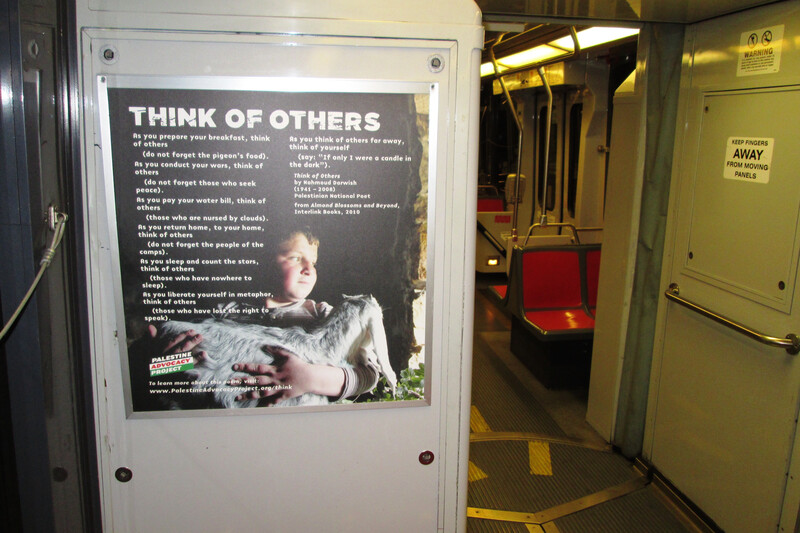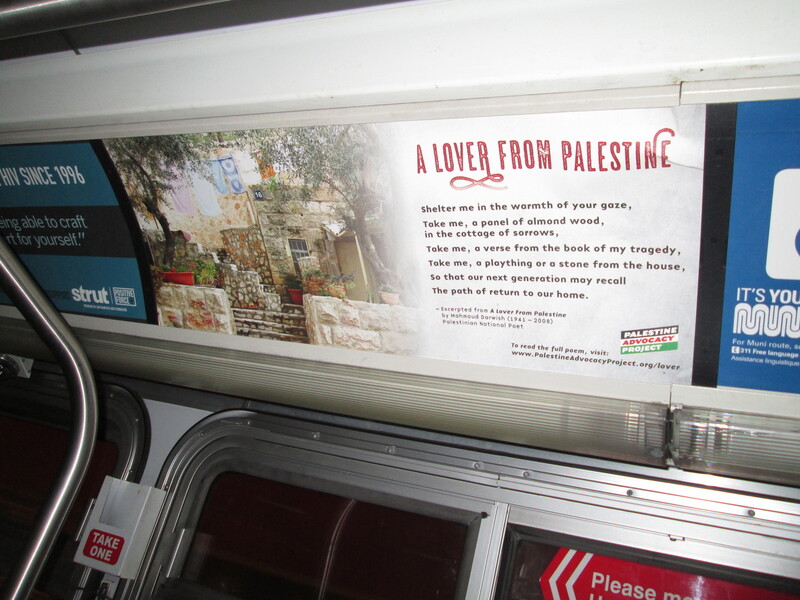Arts and Culture 4 March 2016

Mahmoud Darwish’s poems will run on San Francisco buses and trains throughout March.
If you ride on San Francisco’s Muni buses or light rail trains this month, you might pass the time contemplating the words of Mahmoud Darwish, often described as Palestine’s national poet.
Throughout March, the nonprofit Palestine Advocacy Project is running ads on the public transportation system featuring selections of Darwish’s poetry, including excerpts from “Passport,” “Under Siege,” “Earth Poem” and “A Lover from Palestine.”
The posters also feature images of everyday life in the West Bank, including Jerusalem, and the Gaza Strip.
“Darwish captures the dual emotions of homesickness and hope that have defined the past several decades of Palestinian popular art,” Palestine Advocacy Project board member Clare Maxwell said in a press release from the group. “I think a lot of people in the Bay Area will be able to relate.”

The ads also include images of everyday life in the occupied West Bank and Gaza Strip.
Darwish is recognized as one of the greatest poets of the 20th century, whose work has been translated into many languages.
Darwish was born al-Birwa in the northern Galilee, a village destroyed several years after his birth during the Nakba, the 1948 Zionist conquest and ethnic cleansing of most of Palestine.
He went into exile in the early 1970s, living in Beirut and Paris, and returned to the occupied West Bank after the signing of the 1993 Oslo accords between Israel and the Palestine Liberation Organization.
Darwish died in Houston, Texas, in 2008.

Previously, the Palestine Advocacy Project has placed ad campaigns and billboards directly highlighting Israel’s violence and human rights abuses against Palestinians.
The group says it creates “public media and education campaigns that expose Americans to the Palestinian struggle and advocate for an end to Israeli human rights abuses.”
Last November it joined forces with the American Civil Liberties Union to successfully fight for the right to display ads critical of Israel’s abuses, after Boston’s public transport system initially refused to accept them.
The ads and poems featured in the Darwish campaign can all be seen at the Palestine Advocacy Project website.
Images courtesy of Palestine Advocacy Project.





Comments
more, please
Permalink tom hall replied on
This is an important public art project. Many, indeed most Americans, have had little contact with the profound, diverse and above all human culture of Palestine and its people. For them, the standard Israeli view of Palestinians as unworthy of serious attention is the only available image- one cultivated in novels, films, television thrillers, and other media accounts depicting the dispossessed as brutes and terrorists. Presenting excerpts from Mahmoud Darwish's beautiful and moving poetry will contribute to a new understanding on the part of ordinary people. This initiative should be extended to other locations, transport vehicles, billboards, public service broadcast announcements, etc. When hasbara lies are answered with solemn joy through art, the hollowness of Zionist talking points becomes painfully evident. Each new reader of Darwish's verses becomes a witness to truth.
Ochre
Permalink Denis McClean replied on
The second book of the Catalysis trilogy is called Ochre. It has been dedicated to Palestine - Surviving exctinction. Think of how you would react to being told by an Apartheid Theocracy that they inyended to make you an extinct species. I spent last May in San Francisco and fell in love with this city. Great to see the receptive people of the Bay Area being exposed to some honesty. God bless our friends in Pacifica.
Boston's MBTA
Permalink Dore Stein replied on
>Last November it joined forces with the American Civil Liberties Union to successfully fight for the right to display ads critical of Israel’s abuses, after Boston’s public transport system initially refused to accept them.
Unfortunately, that is no longer true according to this Boston Globe article:
https://www.bostonglobe.com/me...
"In November, at a contentious meeting, the MBTA decided it would no longer accept advertisements about political or social issues, saying the moratorium did not violate the First Amendment. The Agency also said it wanted to avoid litigation from people whose advertisements are rejected in the future. "
"Officials said they were confident the ban was legally sound because the Supreme Court had ruled that a similar ban on public transit in Ohio did not violate the US Constitution."